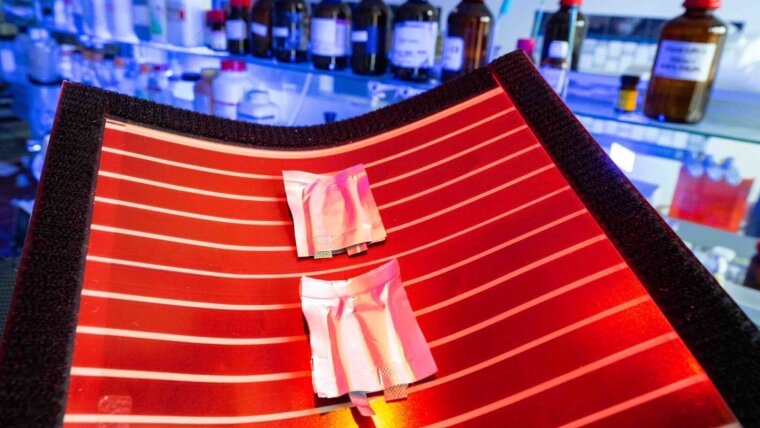
Published: | By: Antonia Rötger/Axel Burchardt
Source article
Friedrich Schiller University Jena and the Helmholtz-Zentrum Berlin (Helmholtz Centre for Materials and Energy, HZB) will jointly establish the "Helmholtz Institute for Polymers in Energy Applications" (HIPOLE) on 1 July 2023. The aim of HIPOLE is to develop sustainable polymer materials for energy technologies that can be rapidly brought into application, in particular polymer-based batteries and perovskite solar cells with polymer additives. HIPOLE will be funded with up to 5.5 million euros per year by the Federal Ministry of Education and Research (BMBF, 90%) and the Free State of Thuringia (10%). In the start-up phase until 2028, the Free State of Thuringia will additionally fund the new institute with more than ten million euros and take over the financing of the construction costs for the laboratories and offices.
In order to achieve the climate goals, innovations and low-cost solutions for energy supply are necessary. Polymer materials, i.e. special plastics, offer great opportunities for this: they can be easily processed and specifically "functionalised" to enable innovative, sustainable, marketable and reliable technologies. Friedrich Schiller University Jena and the Helmholtz-Zentrum Berlin (Helmholtz Centre for Materials and Energy, HZB) are now joining forces to build up a critical mass of expertise and develop innovative technologies for energy storage, hydrogen generation and photovoltaics based on polymer chemistry and materials science. To this end, sustainable polymers in particular are to be designed to enable rapid material development, also using high-throughput methods and artificial intelligence.
Located in a unique academic and entrepreneurial environment
HIPOLE will move into two floors in the new building of the application centre of the "Center for Energy and Environmental Chemistry" (AWZ CEEC Jena) of the University of Jena at the Landgrafen Campus from October 2023. For further projects of the institute, it is planned to rent space in the incubator "lab2fab" of the Jena Technology and Innovation Park, which is scheduled for completion in 2024. HIPOLE is thus embedded in a unique academic and entrepreneurial "ecosystem", the Jena researchers are convinced. This is because the activities of CEEC Jena at the University of Jena will be carried out in the direct vicinity of the incubator in the adjacent new buildings CEEC Jena I and II. In addition to participating in large scientific collaborative projects, HIPOLE also aims to further strategically build partnerships with companies at an early stage of research and development.
Founding director and spokesperson of HIPOLE is Prof. Dr Ulrich S. Schubert from the University of Jena; co-spokesperson is Prof. Dr Yan Lu, an internationally recognised polymer expert at HZB, who will take up a professorship at the University of Jena in the winter semester.
Prof. Dr Bernd Rech, scientific director of HZB, is looking forward to the establishment of HIPOLE as part of HZB. "With HIPOLE, we get the unique opportunity to shape the scientific field of polymers for significant sustainable energy technologies at the forefront of the world," he says. "The expertise in polymer chemistry and technology applications at the University of Jena ideally complements HZB's experience in photovoltaics, battery research and state-of-the-art synchrotron-based operando analysis methods of chemical processes."
Developing internationally competitive energy materials
"The research activities in the field of polymer-based energy storage and conversion that were started at the University of Jena in 2009 reach a next culmination point with the establishment of HIPOLE," says Prof. Schubert. "In addition to the acquisition of large collaborative projects funded by the German Research Foundation, the Federal Ministry of Education and Research, the Carl Zeiss Foundation and industrial projects, the construction of new buildings for the CEEC Jena and HIPOLE with an investment sum of more than 65 million euros, the permanent involvement of the federal government in the promotion of the Jena location has now been achieved. I would like to thank the Friedrich Schiller University, the BMBF and especially the Free State of Thuringia and Minister Tiefensee for their many years of intense support. With HIPOLE, we are in a position to provide significant impetus in the field of energy materials that, together with HZB, are also internationally competitive," the Jena scientist is certain.